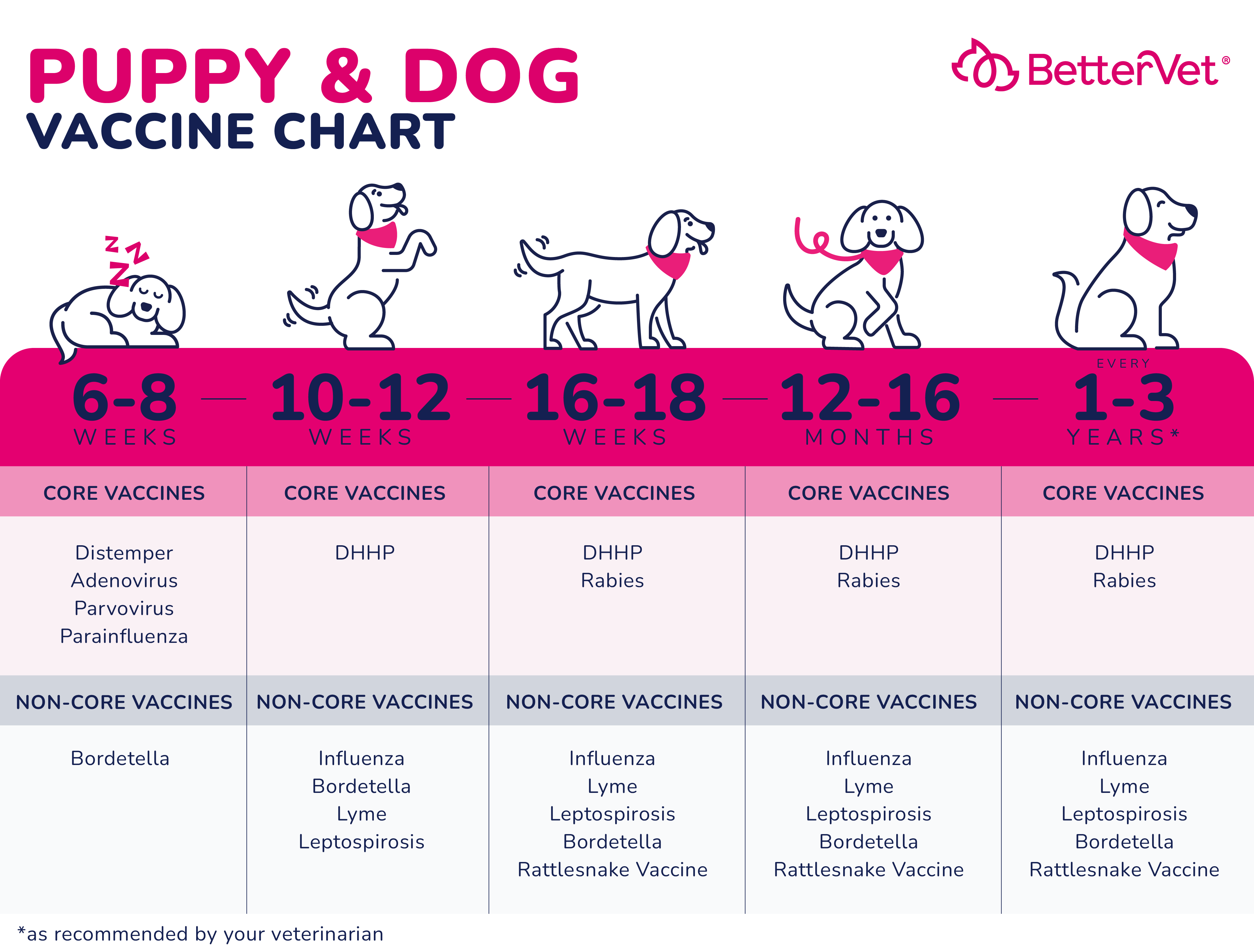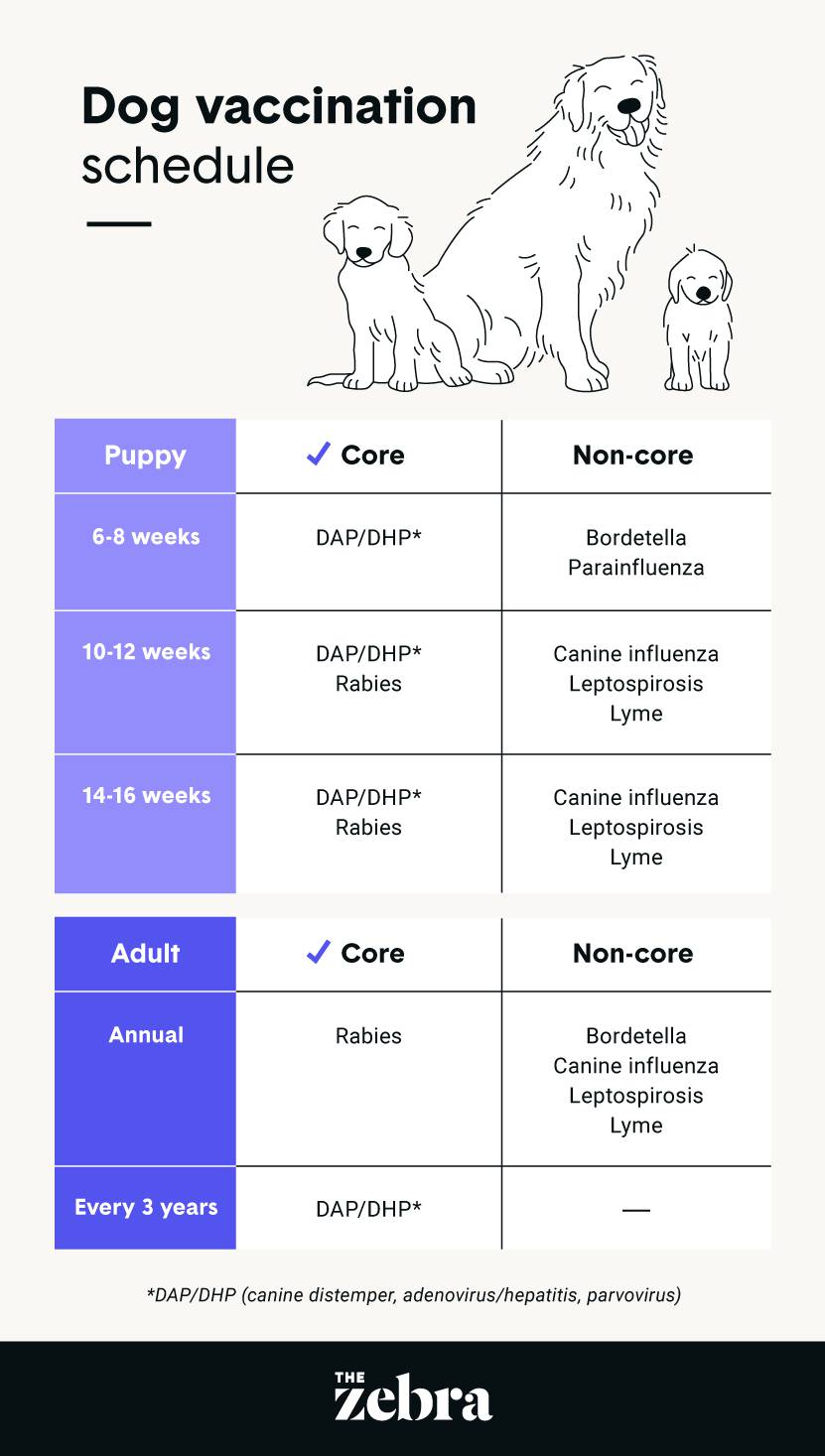Keep your dog healthy with our detailed vaccine schedule. Learn about core and non-core vaccinations, when to vaccinate, and why it’s crucial for your pet’s well-being.
Complete Dog Vaccine Schedule: Key Vaccines for Every Stage of Your Dog’s Life
Core vaccines protect against diseases like parvovirus, distemper, and rabies. Non-core vaccines may be recommended based on lifestyle and risk factors. A proper vaccine schedule ensures your dog is protected from harmful diseases.
Puppies usually start their vaccinations at 6-8 weeks of age. They receive booster shots every few weeks until they are 16 weeks old. Adult dogs need annual or triennial boosters to maintain immunity. Consult your veterinarian for a tailored vaccine schedule. This ensures your dog’s health is safeguarded effectively.

Credit: bettervet.com
Understanding rescue dog adoption benefits is important for new pet owners, along with following proper vaccine schedules.
Core / Non Core Dog Vaccine Schedules
Dog vaccine schedules include core vaccines, essential for all dogs, and non-core vaccines, tailored to specific needs. Core vaccines protect against critical diseases like rabies and parvovirus. Non-core vaccines cover region-specific or lifestyle-related risks.
Vaccinating your dog can be a complex task. Understanding core and non-core vaccines is essential for your pet’s health. Let’s break down these vaccine schedules to make it easier.
Core Vaccine Schedules
Core vaccines are vital for all dogs. These vaccines protect against severe and widespread diseases. Here’s what you need to know:
- Canine Parvovirus: Prevents severe gastrointestinal illness.
- Canine Distemper: Shields against a highly contagious viral disease.
- Canine Adenovirus (Hepatitis): Protects against infectious hepatitis.
- Rabies: Essential for preventing a fatal disease transmissible to humans.
Non-core Vaccine Schedules
Non-core vaccines are optional and depend on your dog’s lifestyle and environment. They address specific risks.
- Bordetella: Protects against kennel cough, especially for social dogs.
- Lyme Disease: Recommended for dogs in tick-infested areas.
- Leptospirosis: Shields against a bacterial infection common in wet environments.
- Canine Influenza: Suggested for dogs frequently in contact with others.
Dog Vaccine Scheduling Tips
Proper scheduling is crucial for vaccine effectiveness. Follow these general guidelines:
- Puppies: Start core vaccines at 6-8 weeks, with boosters every 3-4 weeks until 16 weeks old.
- Adults: Annual or triennial boosters, depending on the vaccine.
- Non-Core: Consult your vet based on your dog’s risk factors.
Importance Of Regular Vet Visits
Regular vet check-ups ensure your dog’s vaccine schedule is up-to-date. These visits help to:
- Monitor Health: Detect potential health issues early.
- Adjust Schedules: Tailor vaccine schedules as your dog ages or lifestyle changes.
- Discuss Concerns: Address any side effects or reactions.
Understanding and following core and non-core vaccine schedules can safeguard your furry friend’s health. Always consult your vet to tailor the best plan for your dog.
A clear dog vaccine schedule is crucial for preventing common health issues in pets and ensuring their wellbeing.

Credit: www.thezebra.com
FAQ About Dog Vaccine Scheduling
What Are Core Dog Vaccines?
Core vaccines protect against severe diseases like parvovirus, distemper, rabies, and adenovirus. These are essential for all dogs.
How Often Should Dogs Get Vaccinated?
Puppies need vaccines every 3-4 weeks until 16 weeks old. Adult dogs require annual or triennial boosters.
What Is A Puppy Vaccination Schedule?
Puppies get vaccines at 6-8, 10-12, and 14-16 weeks. Boosters follow annually or every three years.
Are Dog Vaccines Safe?
Yes, vaccines are generally safe. Side effects are rare and typically mild, like soreness or mild fever.
Can Vaccinated Dogs Still Get Sick?
Vaccinated dogs have strong immunity but can still get sick if exposed to highly virulent strains or if immunity wanes.
What Are Non-core Dog Vaccines?
Non-core vaccines include those for Lyme disease, Bordetella, and canine influenza. These depend on the dog’s lifestyle and risk.
When Should A Dog Get A Rabies Shot?
Dogs should get their first rabies shot at 3-4 months old, followed by boosters every one to three years.
What Are The Side Effects Of Dog Vaccines?
Common side effects include mild fever, lethargy, and soreness. Severe reactions are rare but require immediate vet attention.
Why Are Booster Shots Important?
Booster shots maintain immunity against diseases. They ensure long-term protection as initial vaccine efficacy can wane.
Can I Vaccinate My Dog At Home?
It’s unsafe to vaccinate your dog at home. Always consult a veterinarian for proper administration and monitoring.
Complete CAT Vaccine Schedule: ( 2 Types) Core and Non-Core Vaccines
Conclusion
A well-planned vaccine schedule is vital to ensuring your dog remains healthy and protected from preventable diseases. Regular vet visits and timely vaccinations are key to maintaining your pet’s immunity and overall well-being. Keeping a record of vaccination dates not only helps you stay organized but also provides peace of mind, knowing your furry friend is safeguarded against health risks.
Your dog’s health and happiness depend on proactive care. Start today by committing to a vaccination routine that gives them the best chance at a long, joyful life. For more tips on dog care, including detailed vaccination schedules and expert advice, explore our Blog Section to learn how to provide the best for your loyal companion!



